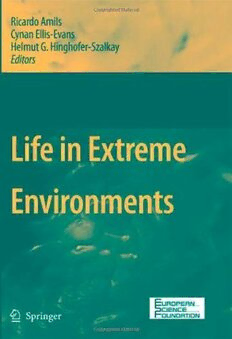
Life in Extreme Environments PDF
440 Pages·2007·6.496 MB·English
Most books are stored in the elastic cloud where traffic is expensive. For this reason, we have a limit on daily download.
Preview Life in Extreme Environments
Description:
From the deepest seafloor to the highest mountain, from the hottest region to the cold Antarctic plateau, environments labeled as extreme are numerous on Earth and they present a wide variety of features and characteristics. The life processes occurring within these environments are equally diverse, not only depending on stress factors (e.g. temperature, pressure, pH and chemicals) but also on the type of life forms, ranging from microbes to higher species. How is life limited by and adapted to extreme external biotic and abiotic factors? This key question summarises the deliberations raised by this exciting and fascinating research area. Addressing the challenge of answering this question would help to reveal new insights and refine theories concerning the origin and evolution of life on our planet, as well as life beyond Earth. Investigating life processes under extreme conditions can also bring clues for understanding and predicting ecosystems' responses to global changes. Furthermore, this area of research has a wide application potential in the fields of (bio)technoloty, chemical industry, pharmaceutics, biomedicine or cosmetics. (Investigating Life in Extreme Environments - A European perspective, European Science Foundation, May 2007)
See more
The list of books you might like
Most books are stored in the elastic cloud where traffic is expensive. For this reason, we have a limit on daily download.
